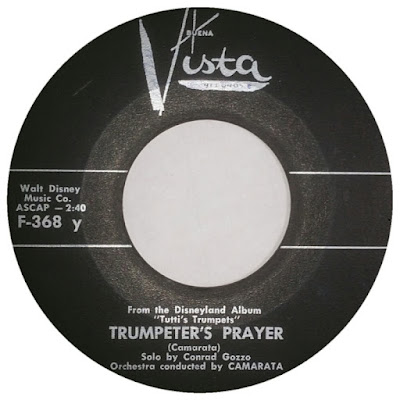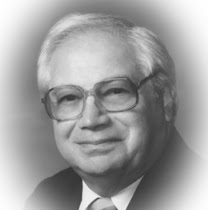
Salvador "Tutti" Camarata (May 11, 1913 – April 13, 2005) played an important role in American popular music as an arranger, conductor, musical director and record company executive; his career stretched from the early days of Bing Crosby to the digital age, and he arranged and conducted television shows for artists as diverse as Louis Armstrong and Noel Coward.
 Salvatore Tutti Camarata (sometimes also known as "Toots") was born on May 11 1913 at Glen Ridge, New Jersey, one of eight children of Sicilian immigrants. He learned the violin from the age of 11 and took up the trumpet at 14. He won a scholarship to the Juilliard School of Music, where he studied composition and orchestration with Walter Damrosch and conducting with Cesare Sodero of the Metropolitan Opera.
Salvatore Tutti Camarata (sometimes also known as "Toots") was born on May 11 1913 at Glen Ridge, New Jersey, one of eight children of Sicilian immigrants. He learned the violin from the age of 11 and took up the trumpet at 14. He won a scholarship to the Juilliard School of Music, where he studied composition and orchestration with Walter Damrosch and conducting with Cesare Sodero of the Metropolitan Opera. |
| Charlie Barnet |
To comply with a radio sponsor's request that the last three minutes of
each show should feature all the band's stars, Camarata devised the "three-in-one" arrangement, incorporating a section in slow tempo for Eberly, another in swing-time for O'Connell, and a bravura finale by the orchestra. This led directly to two No 1 records - Green Eyes and Maria Elena - in 1941, and several minor hits.
After leaving Dorsey in 1942, Camarata worked briefly for the Casa Loma Orchestra and Benny Goodman, before joining the US Army Air Force as a flight instructor. On leaving the forces, he arranged and conducted a series of recording sessions for Billie Holiday which yielded such widely loved pieces as Loverman, That Ole Devil Called Love and Don't Explain. He was subsequently appointed musical director at Decca Records in New York.
 In 1945 Camarata accepted an invitation from J Arthur Rank to come to London to act as musical director on London Town, an ambitious attempt to create a British film musical to rival the Hollywood product. The film starred Sid Field, Kay Kendall, and a very young Petula Clark. The big band Camarata put together for this film later became the core of Ted Heath's band.
In 1945 Camarata accepted an invitation from J Arthur Rank to come to London to act as musical director on London Town, an ambitious attempt to create a British film musical to rival the Hollywood product. The film starred Sid Field, Kay Kendall, and a very young Petula Clark. The big band Camarata put together for this film later became the core of Ted Heath's band. He became close friends with Sir Edward Lewis, CEO of the U.K. arm of Decca, and together, the two founded London Records with the aim of distributing music from the U.K. in the U.S. market. It was by this means that Vera Lynn gained an unexpected gold disc for her recording of Now Is The Hour, and Ted Heath, Mantovani and others found an audience in America. Also for the London label, he formed a British session orchestra, the Kingsway Orchestra, to record classical music for the American market.
Back in the United States, Camarata set up Decca's resident big band, a stirring, brassy outfit called the Commanders, which had great popular success with records such as Meet The Commanders and Dance Party. Throughout the 1950s he acted as musical director for numerous television specials by artists such as Frank Sinatra, Bob Hope and Vic Damone.
In 1958 Camarata became co-founder and musical director of Disneyland Records, for which he produced 300 discs over the course of 16 years, including soundtrack albums of Snow White and The Jungle Book. For the subsidiary Disney label, Buena Vista, he had great success with two "easy listening" albums, Tutti's
Trumpets and Tutti's Trombones. He was honoured with the Disney Legends Award in 2003
 |
| Camarata with Louis Armstrong |
One of his last creative endeavours was the orchestration of a number of the most popular numbers from the Church of Latter Day Saints' hymnal. Camarata then travelled to London, where he recruited and conducted an ensemble including a 100-piece orchestra, a choir of 180 adults, a children's choir, a pipe organ, and a brass section for the resulting recording, The Power and the Glory. "This is the most important album I have ever done," he said of the work when it was completed.
Tutti Camarata continued to conduct and record into the 1990s, and to run his own recording studio, Sunset Sounds, on Sunset Boulevard, which he eventually handed over to his son, Paul.
Tutti died after a short illness at Providence St. Joseph Medical Centre in Burbank, California at the age of 91. Doreen, his wife of 67 years died in 2004.
(Compiled and edited from various sources mainly warwickmusic.com)



